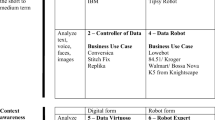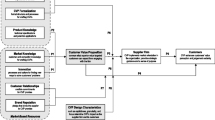Abstract
We examine the applicability of Anderson's (1982) procedural learning framework to consumer decision making within the context of how marketing communications influence people's procedural knowledge about selecting decision criteria for a buying decision. In particular, we explore the importance of explicit, conditional “if-then” statements (e.g., “if you are choosing amongst ..., then you should ...”) in which the recommended decision-making operation is compatible with prior procedural knowledge. We test this framework in an exploratory study on advertising effects on women's decision criteria for fitness centers.
Similar content being viewed by others
References
Anderson, John R. (1982). “Acquisition of Cognitive Skills,”Psychological Review 89, 369–406.
Anderson, John R. (1983).The Architecture of Cognition. Cambridge, MA: Harvard University Press.
Anderson, John R. (1987). “Skill Acquisition: Compilation of Weak-Method Problem Solutions,”Psychological Review 94, 192–210.
Bettman, James R. (1975). “Issues in Designing Consumer Information Environments,”Journal of Consumer Research 2, 169–177.
Bettman, James R., and Mita Sujan. (1987). “Effects of Framing on Evaluation of Comparable and Noncomparable Alternatives by Expert and Novice Consumers,”Journal of Consumer Research 14, 141–154.
Bettman, James R. (1979).An Information Processing Theory of Consumer Choice, Reading: Addison-Wesley.
Lynch, John G., Jr., Howard Marmorstein, and Michael F. Weigold. (1988). “Choices from Sets Including Remembered Brands: Use of Recalled Attributes and Prior Overall Evaluations,”Journal of Consumer Research 15, 169–184.
MacKenzie, Scott. (1986). “The Role of Attention in Mediating the Effect of Advertising on Attribute Importance,”Journal of Consumer Research 13(2), 174–195.
Myers, James H., and Mark I. Alpert. (1977). “Semantic Confusion in Attitude Research: Salience vs. Importance vs. Determinance.” InAdvances in Consumer Research, v. 4, William D. Perreault (ed.), Atlanta, GA: Association for Consumer Research, 106–110.
Newell, A., and P. Rosenbloom. (1981). “Mechanisms of Skill Acquisitions and the Law of Practice.” In J. R. Anderson (ed.),Cognitive Skills and Their Acquisition, Hillsdale, NJ: Erlbaum, 57–84.
Payne, John W. (1982). “Contingent Decision Behavior,”Psychological Bulletin 92, 382–402.
Russo, J. Edward, Gene Krieser, and Sally Miyashita. (000). “An Effective Display of Unit Price Information.”Journal of Marketing 39, 11–19.
Smith, Eliot. (1989). “Procedural Efficiency: General and Specific Components and Effects on Social Judgment,”Journal of Experimental Social Psychology 25, 500–523.
Weitz, Barton A., Harish Sujan, and Mita Sujan. (1986). “Knowledge, Motivation and Adaptive Behavior: A Framework for Improving Selling Effectiveness,”Journal of Marketing 50, 174–191.
Wright, Peter. (1979). “Concrete Action Plans in TV Messages to Increase Reading of Drug Warnings,”Journal of Consumer Research 6, 156–169.
Wright, Peter, and Peter Rip. (1980). “Product Class Advertising Effects on First-Time Buyers’ Decision Strategies,”Journal of Consumer Research 7, 176–188.
Wright, Peter. (1973). “The Cognitive Processes Mediating Acceptance of Advertising,”Journal of Marketing Research Vol. X (February), 53–62.
Author information
Authors and Affiliations
Rights and permissions
About this article
Cite this article
Kirmani, A., Wright, P. Procedural learning, consumer decision making, and marketing communication. Marketing Letters 4, 39–48 (1993). https://doi.org/10.1007/BF00994186
Issue Date:
DOI: https://doi.org/10.1007/BF00994186




